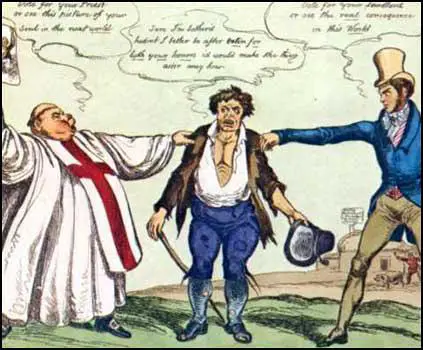The Catholic Association
In 1823 Daniel O'Connell, Richard Lalor Sheil and Thomas Wyse formed the Catholic Association. As Vincent Comerford has pointed out: "At O'Connell's insistence the new body had a stated objective much wider than the simple ‘relief’ or emancipation which would allow a small minority of Catholics like himself to proceed to inner bar, bench, or parliament: it was to address all the concerns of the Roman Catholic collectivity. This signalled the start of a mobilization of the populace for constitutional political ends which had little precedent anywhere, was contrary to the instincts of contemporary Liberals, and was to make O'Connell a historical figure of European significance." (1)
In its first manifesto the Catholic Association argued: "The catholics of Ireland have long been engaged in a painful and anxious struggle to attain, by peaceful and constitutional means, those civil rights, to which every subject of these realms is entitled, and of which our forefathers were basely... deprived ... At no former period of this protracted struggle had the catholic people of Ireland so little reason to entertain hope of immediate success... but they do not dare to despair. They know that their cause is just and holy. It is the cause of religion and liberty. It is the cause of their country and their God." (2)

O'Connell turned the Catholic Association into a mass organisation by inviting the poor to become associate members for a shilling a year. Catholic priests were encouraged to advertise the Catholic Association and were employed as recruiting agents. "The Association had a ready network of agents in every parish to stir opinion and to collect the penny a month Catholic Rent to finance the agitation." (3)
The Catholic Association campaigned for the repeal of the Act of Union, the end of the Irish tithe system, universal suffrage and a secret ballot for parliamentary elections. Although O'Connell rejected the use of violence he constantly warned the British government that if reform did not take place, the Irish masses would start listening to the "counsels of violent men". (4)
By 1826 the Catholic Association began supporting candidates in parliamentary elections. They had some spectacular victories, including Daniel O'Connell defeating C. E. Vesty Fitzgerald, President of the Board of Trade, in a County Clare by-election. However, as a Catholic, O'Connell could not take the Oath of Supremacy, which was incompatible with Catholicism and so could not take his seat in the House of Commons. (5)
Radical MPs such as Sir Francis Burdett and Joseph Hume, had been arguing for some years that Parliament should bring an end to anti-Catholic legislation. After O'Connell's victory, even Tories such as Sir Robert Peel and Arthur Wellesley, Duke of Wellington, began arguing for reform. They warned their Conservative colleagues that here would be civil war in Ireland unless the law was changed. The Roman Catholic Relief Bill was published in March 1829. O'Connell wrote to his wife: "Peel's bill for Emancipation, is good - very good, frank, direct, complete; no veto, no control". (6)
In 1829 the British Parliament passed the Roman Catholic Relief Act, which granted Catholic Emancipation. O'Connell was less pleased with the Irish Parliamentary Election Bill, that raised the threshold for the county franchise from 40s. to £10, thereby disenfranchising the bulk of his electoral support. As a result of this legislation the Irish electorate was reduced from 200,000 to 26,000. (7)
Daniel O'Connell celebrating Catholic Emancipation (1829)
The government also outlawed the Catholic Association. However, on 30th May, 1829, O'Connell was returned unopposed for County Clare and he took his seat on 4th February 1830. Over the next few years O'Connell became a major figure in the House of Commons. He was active in the campaigns for prison and law reform, free trade, the abolition of slavery and Jewish emancipation. He was also a prominent figure in the campaign for universal suffrage. After the disappointment of the 1832 Reform Act, British Radicals adopted the tactics that had been used by O'Connell successfully in Ireland. Organizations such as the Chartists used O'Connell's methods of organizing and applying the pressure of public opinion while implying that if this was not successful, the movement might resort to violence. (8)
Primary Sources
(1) The Committee of the Catholic Association (1824)
The catholics of Ireland have long been engaged in a painful and anxious struggle to attain, by peaceful and constitutional means, those civil rights, to which every subject of these realms is entitled, and of which our forefathers were basely... deprived ... At no former period of this protracted struggle had the catholic people of Ireland so little reason to entertain hope of immediate success... but they do not dare to despair. They know that their cause is just and holy. It is the cause of religion and liberty. It is the cause of their country and their God... But, in order effectively to exert the energies of the Irish people, pecuniary resources are absolutely necessary... Your committee propose: that a monthly subscription should be raised throughout Ireland, to be denominated "The monthly catholic rent" ... care to be taken to publish in or near each catholic chapel as may be permitted by the clergy, the particulars of the sums subscribed ... and that the amount expected from each individual shall not exceed one penny per month.
Student Activities
Child Labour Simulation (Teacher Notes)
Health Problems in Industrial Towns (Answer Commentary)
Public Health Reform in the 19th century (Answer Commentary)
Richard Arkwright and the Factory System (Answer Commentary)
Robert Owen and New Lanark (Answer Commentary)
James Watt and Steam Power (Answer Commentary)
The Domestic System (Answer Commentary)
